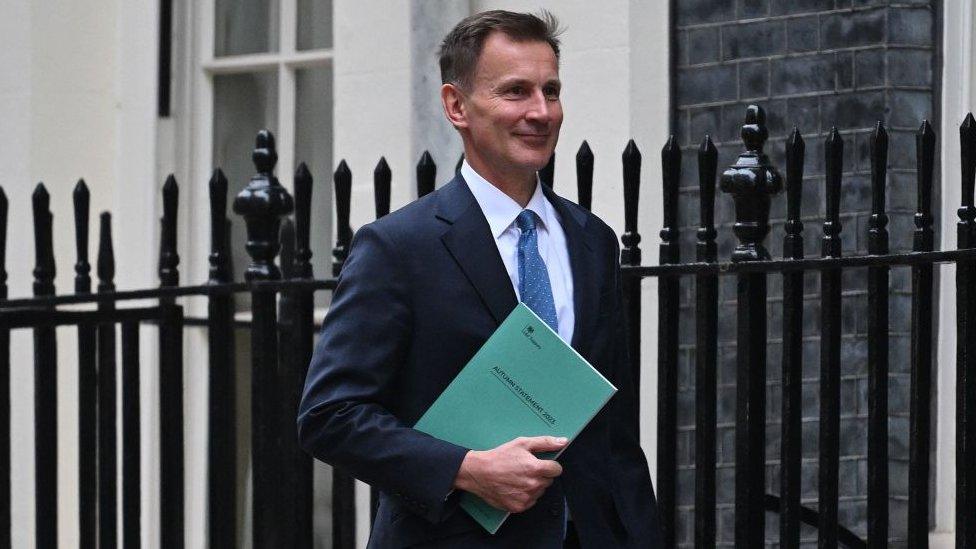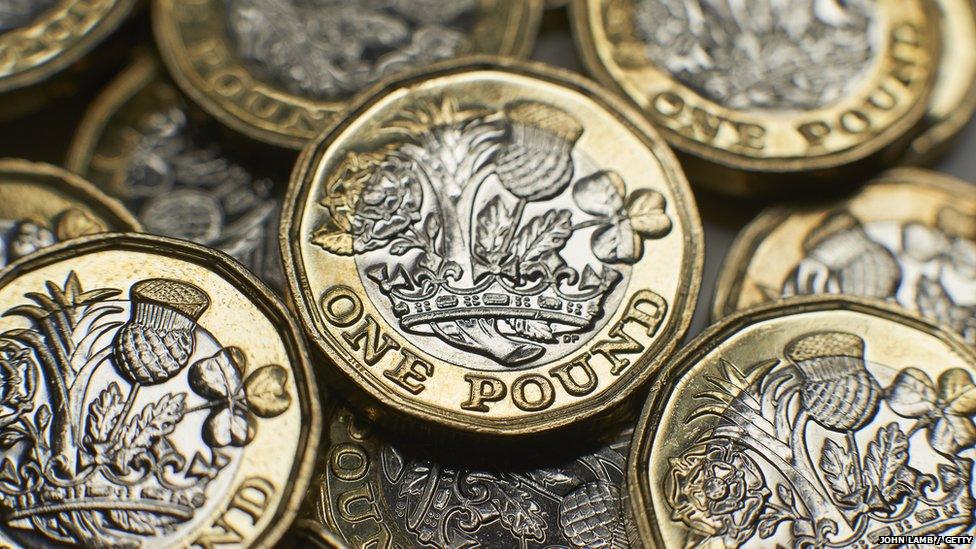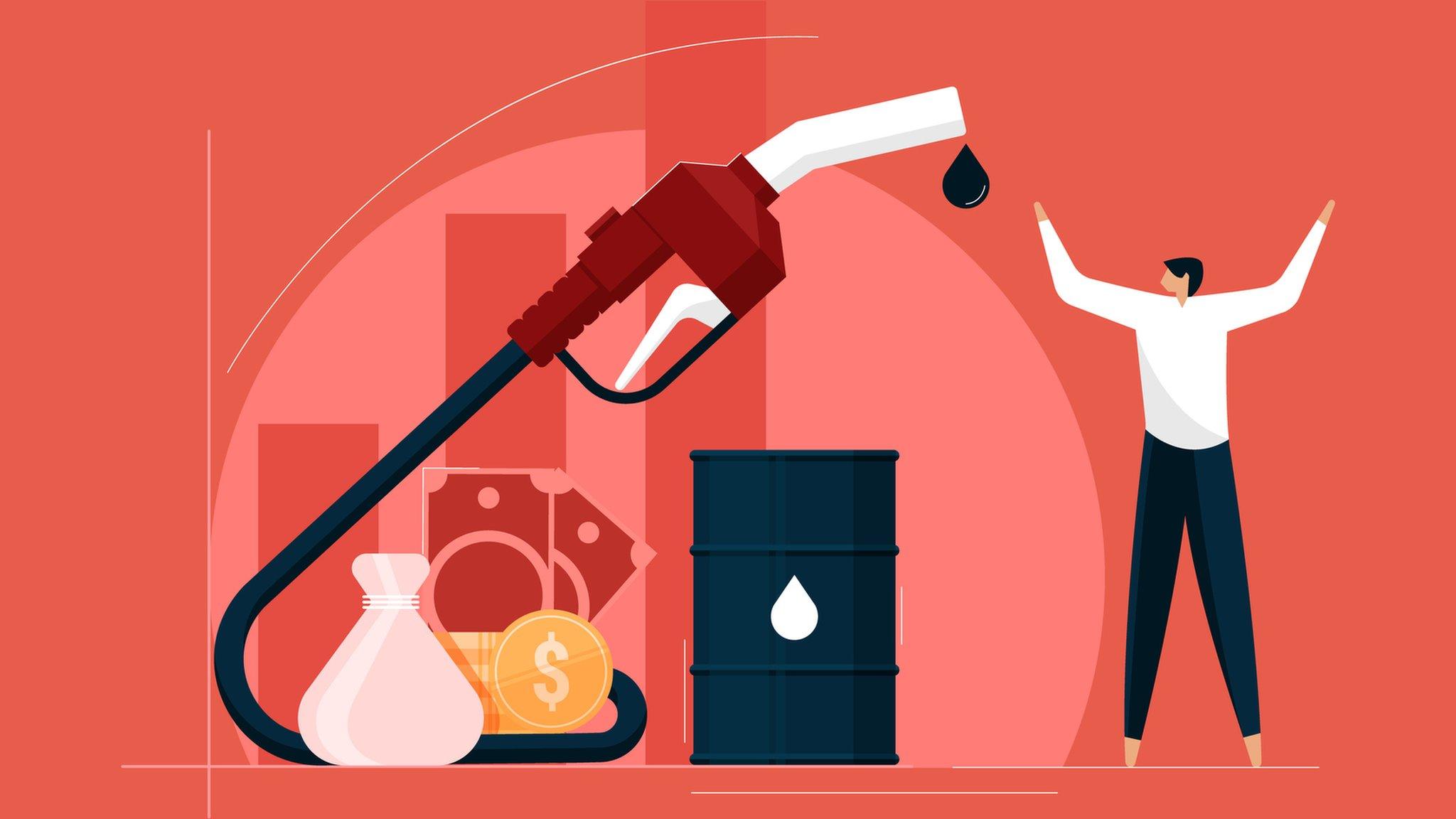Autumn Statement: 10 things we learned
- Published
- comments

UK Chancellor Jeremy Hunt has been unveiling the government's tax and spending plans in the Autumn Statement.
This usually happens once a year and is an important date in the government's calendar.
Jeremy Hunt, the current chancellor of the exchequer and part of the Conservative cabinet, also gave an update on the current state of the country's finances.
So what did he actually say?
1. Price rises should slow down
Sharply rising prices, especially for essential items like food, have had a big impact on many families during the cost of living crisis. Because these day-to-day items are costing more, and most people's wages have not increased at the same rate, many people are struggling to pay for things that were affordable before. This means making tough choices about what they can spend money on.
Official figures show that food prices have increased by 30% over the last two years - but the government's independent forecaster, the Office for Budget Responsibility (OBR), said it now expects the inflation rate to drop to 2.8% by the end of next year.
This means prices will still rise, but not as fast as they have been. This also isn't guaranteed, and things could change between now and then.

Nothing was said about cost-of-living payments, which have been important for many people on low incomes.
The BBC's Cost of living correspondent Kevin Peachey said: "It seems there are no clear plans of further targeted financial help to help people pay the bills."
2. The minimum wage and the Autumn Statement
One of the big changes the government want to make is raising the minimum wage - known officially as the National Living Wage.
This is the amount of money employers have to pay to workers by law.
Under Mr Hunt's plan this would rise from £10.42 to £11.44 per hour from April next year, an increase of 9.8% and worth up to £1,800 for a full-time worker.
The higher wage will also be paid to 21 and 22-year-olds for the first time.
3. Tax on earnings - National Insurance cuts
Mr Hunt said he would also cut National Insurance (NI)- money adults pay on earnings - from 6 January.
It is currently set at 12% on earnings between £12,571 and £50,271. That means 12% of someone's wage goes to the government in tax. This is used to pay for things like schools, the police and the NHS.
What is National Insurance?
NI works in a similar way to income tax, deducting a fixed percentage of the money you earn from your wages. What you pay depends on what you earn.
This would decrease by two percent to 10%, which means someone on the average salary of £35,000 will save over £450 a year.
But as BBC correspondent Kevin Peachey points out, there will be no change in income tax, which means many people will end up paying more tax by being dragged into a higher tax band.
Shadow chancellor Rachel Reeves, from opposition party Labour, said today's tax announcements will leave people "worse off".
She said that tax increases by the Tories and failure to update tax bands means that 2% cut in National Insurance will "not remotely" offset the earlier tax rises by the Conservative government.
She has said that British people "will not be taken for fools".
She also pointed out how much mortgages for homeowners have risen, after last year's mini-budget by Kwasi Kwarteng, who worked alongside former PM Liz Truss.
Ms Reeves said nothing the government has announced "will remotely compensate" for this or cost of living pressures.
4. Increase in some benefit payments
Benefits including Universal Credit to support people not in work, and disability benefits, will increase next year by 6.7%.
This is in line with the rate of inflation for September - with the aim of reducing the financial impact of rising costs to individuals and families.

The government also announced £1.3bn over the next five years to help people with health conditions find jobs, and a further £1.3bn to help people who have been unemployed for over a year.
Benefits are fully devolved in Northern Ireland, but changes are likely to be similar to those for the rest of the UK.
5. Welfare payments at risk
The government said it would introduce some cuts to benefits for those who are out of work for 18 months or longer.
The chancellor said that if someone hasn't found work in this time they will have to take part in a work placement "to increase their skills and improve their employability".
If they "choose not to engage with the work search process for six months, we will close their case and stop their benefits", he says.
There will also be a change of rules for people who receive benefits because they are unable to work owing to health conditions with home working being cited as a possible option for some.
6. Housing help - Local Authority Allowance

The chancellor said he plans increase the Local Housing Allowance rate, which helps people on benefits pay their rent to a private landlord.
This has been frozen since 2020, despite rents rising sharply, but the plan is now to pay claimants 30% of local market rents.
This will give 1.6 million households an average of £800 of support next year, he said.
7. Support for businesses
Amongst the announcements for businesses - companies - the chancellor said the current 75% discount on business rates - money companies pay to the government up to £110,000 - will also be extended to include retail, hospitality and leisure businesses for another year.
The government says it is also making permanent a tax break for businesses - which allows them to offset investment in machinery, IT and equipment against the tax they pay.
8. Electricity and renewable energy
Households living close to new pylons and transmission infrastructure will get up to £1,000 a year off energy bills over the next 10 years.
This comes as part of a plan to reform the way clean energy businesses can access the electricity grid, which the government will share more details of later.
The chancellor also announced a £960m investment for green energy (power that has less impact on the environment), to fund offshore wind farms, nuclear, carbon capture, and hydrogen power projects, as part of a larger project.
'These targeted investments will make sure the UK remains competitive,' he said.
9. Investment in technology and arts

The chancellor announced £500m funding for UK artificial intelligence over the next two years, to fund more "innovation centres" to help make the UK an "AI powerhouse".
He also spoke of the benefits the UK had received from having films like Barbie made in local studios in Watford and how more investment in visual affects could help add to this.
10. Tackling Anti-Semitism
The chancellor announced the government's plans to give seven millions pounds towards tackling Anti-Semitism in British schools and universities.
There has been an increase in attacks on Jewish communities in the UK and other parts of the world, since the conflicts in Israel and Gaza began.
- Published21 November 2023

- Published15 November 2023

